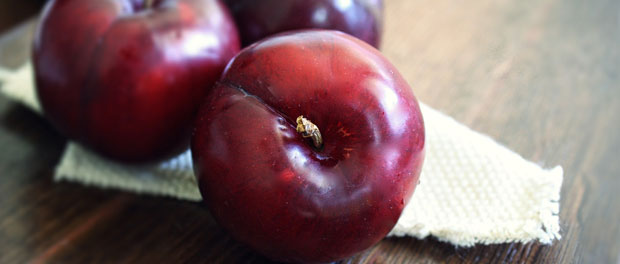 More than 20 years ago, I sat at my desk, at my first publishing job, feeling overwhelmed. The desk was piled high with projects, and numerous stresses pressed against my mind that day. To save money, I’d packed a lunch. Unwilling to leave my desk—perhaps I could work while eating?—I bit into the red plum I’d brought. And then everything changed.
More than 20 years ago, I sat at my desk, at my first publishing job, feeling overwhelmed. The desk was piled high with projects, and numerous stresses pressed against my mind that day. To save money, I’d packed a lunch. Unwilling to leave my desk—perhaps I could work while eating?—I bit into the red plum I’d brought. And then everything changed.
When a plum is at the perfect point of ripeness, your teeth break its skin, and the juice explodes in your mouth. That’s what happened to me: the bite and the bursting of flavor. And memory. Suddenly I was transported to my childhood and Grandmother’s backyard. She had several fruit trees, and there was nothing quite like picking a plum or peach, still warm from the sun, and biting into it. In the present, I sat at my desk in Chicago’s metropolis, but I also existed in my past, with my family, with peaceful summer days, and with love that transcends decades.
That memory was a grace, pulling me out of my stress and narrow vision of life, which included little more than endless tasks and daily worries. When the bright taste of fruit filled my mouth, I remembered that life was much more than the job at hand. I would get through these stressful days. The work would get done. My husband and I would figure out how to manage our multiple worries. The life God had given me was broad and deep and full, but sometimes I forgot that.
The beauty of our physical senses is that they can reboot our thinking patterns. The taste of sweet, ripe plum goes around my defenses and touches me so that I can experience something other than my worries or arguments. The physical body is designed to trick us into letting go of rationalization and heeding the taste and welcoming the memory it triggers. My memory of Grandmother’s yard triggered happiness, and my response was gratitude. In gratitude I encountered God.
Taste works in many ways, and we can work with this marvelous sense so that our hearts open up and our prayer happens naturally.
- Try eating more slowly and intentionally. As you eat, think about all the people involved in bringing this food to you: growers, harvesters, factory workers, truckers, and so on. Whisper a prayer of thanks for each person involved.
- Choose food for its flavor. When you eat the food, concentrate on its taste, and allow yourself some joy.
- If taste triggers a memory or emotion, linger there. There’s a reason for this connection. Ask the Holy Spirit to help you understand why you’re having this reaction, whether it’s positive or negative.
- Try eating a smaller portion of food, and choose one or two foods rather than several. Learn to enjoy this more focused way of eating, and pay attention to what satisfies and when. This kind of attention can guide you to healthier eating.
- Share the joy. Invite someone to eat with you. It can be a simple event—a shared piece of fruit or an extra portion of homemade bread or dessert. Jesus understood that eating together builds relationships.
How have you encountered God through the sense of taste?
Today’s 31 Days with St. Ignatius reading, by Tim Muldoon, invites us to consider Care of the Person, Care of the Self.

Had a plumb pit in my mouth when this devotional popped up on my smart phone!
“This Is Just To Say”
I have eaten
the plums
that were in
the icebox
and which
you were probably
saving
for breakfast
Forgive me
they were delicious
so sweet
and so cold
-William Carlos Williams
#FindingGodInAllThings